
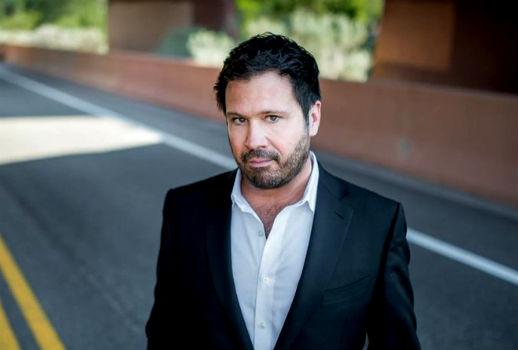
parterre box: Welcome to Philadelphia. I found this book at the library that you might find interesting: Oscar Wilde and the Vampire Murders by Gyles Brandeth.
David Daniels: They’re a whole series of books. They’re incredible. Sort of Oscar Wilde’s twist on Sherlock Holmes. Unfortunately, it’s not Benedict Cumberbatch.
PB: There seem to be a lot of Oscar Wildes floating around out there: playwright, bon vivant, family man, aesthete, martyr, even hero of detective novels. Who is the Oscar Wilde of Theodore Morrison‘s opera Oscar? Who is your Oscar?
DD: When I approached this situation and this opera the first time, I just made sure it was clear to everyone that I’m not here to do an imitation of Oscar Wilde, to emulate him, to do his mannerisms. To me, more important about this piece is to get the message out about this man, his story and him as a human being. So it’s really my own personal memories and emotional feelings of similar things, though obviously I’ve not been in prison. That’s sort of where I have to dig deep with this. Our story is not about the happiness and the frivolity and the holding court at parties. it’s about a part of Oscar Wilde that about 90% of the population is not aware of.
PB: Tell me about how Oscar came about.
DD: I was singing a recital in London with Martin Katz and John Cox (the stage director who coauthored Oscar‘s libretto) was in the audience. I sang a set of songs that Theo composed for me called “Chamber Music” based on five James Joyce poems. John Cox just loved the music. He came backstage and met Theo, and said “You should write an opera,” and Theo said “I will now!” and they came up with the idea of Oscar. I said I wanted it to be something political in nature and a subject matter that is relevant today, something that can be understood today. It just seemed perfect. I didn’t know how perfect until I got into it.
PB: What was it like working with a living composer?
DD: It was wonderful! Theo was my choral professor at the University of Michigan, so I knew him well. He would fly to the Lyric Opera of Chicago or wherever I was singing and bring new music to me. He knew my range, he knew where the best “sweet” part of the voice was for me, so I was really part of this project since its inception, which was almost a decade ago. Although it was hard to get anyone really interested or take it seriously because Theodore Morrison wasn’t a household name as a modern composer.
PB: This is his first opera?
DD: His only opera. My guess is that it will be his only opera. I ended having to get a recording studio. We did it in Ann Arbor, Michigan. I put some students in it and paid the engineer to do a demo CD. That finally got Charles MacKay (General Director of Santa Fe Opera) and David Devan (General Director of Philadelphia Opera) interested.
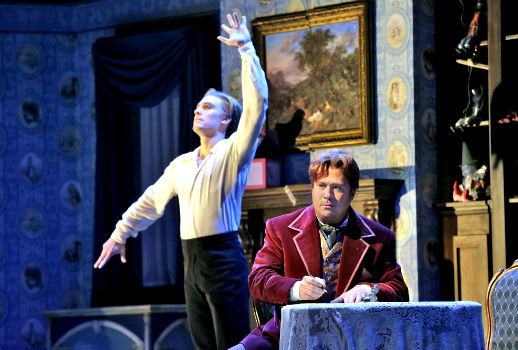
DD: They should expect “Theodore Morrison.” You know, Theo was a singer too, and because of that he really knows how to write for the voice. I’ve always thought there was some “Brittenesque” quality to his music. It’s accessible. It’s not all easy. It’s not easy to learn, to say the least. I’m in the process right now of learning Trinculo in Thomas Ades‘ The Tempest. I’ll be making my Vienna State Opera debut in the spring in that. Now that’s some tough music. I’m hoping doing Oscar will help train me for that.
PB: I don’t know how I feel about Oscar Wilde, the person. For example, from what I’ve read, he had every opportunity to flee to the continent before he went to prison and chose not to. Why?
DD: I don’t think any of us know why. I have my personal view that there was an ego there that was just so enormous. He’d gotten out of everything, nothing like this had ever happened. he had already had two mistrials. He wasn’t found guilty until his third trial. I don’t think he thought anything was going to happen to him. When he was found guilty in the courtroom, I don’t think he had any inkling. it didn’t scare him—he thought he was untouchable. What we do in the opera is tell the darker side of what happened to him, how horrible it was in the prison. He had no paper, no pens. Those Victorian prisoners dressed in hooded masks so nobody could see each other and nobody could communicate with each other except at chapel on Sunday. It was horrible. And all of that was for being gay. But you look at The Imitation Game, this movie that’s just come out about Alan Turing, and 50 years later it was still happening… the castration…
PB: Even, in some countries, now…
DD: Absolutely. Even though things have improved, and there’s a bigger dialogue, marriage equality and all that stuff, it’s not getting through obviously to the youth of this country and around the world, because the young gay suicide rate has just skyrocketed because of non-acceptance.
PB: I would like to think kids have it easier today than we did coming up…
DD: I would like to think that too, I would like think that operas like Oscar or shows like Will & Grace have provided role models to change things, but the statistics don’t say that. The bullying hasn’t stopped. The hate crimes have not slowed down. It just happened here in Philadelphia. So it’s scary.
PB: Do you think Oscar Wilde would have considered himself a gay hero?
DD: I want him to be a hero much more than I want him to be a martyr. But prison killed him; or rather the ear injury that he got in prison is what killed him. So he was basically killed for being a homosexual. This great mind: he died at 46 years old. Can you imagine what things he could have written, what things we could have read? That asshole Bosie (Lord Alfred Douglas) lived to be in his seventies! I hope he looked really old.

DD: June 21st.
PB: …by Supreme Court Justice Ruth Bader Ginsburg—who also happens to be a big opera fan. How did all that come about?
DD: She was quite a vocal advocate for Oscar, the opera. We knew she was coming to see it in Santa Fe. The Washington Post was doing an article on her and they interviewed me on her and how much she meant. Remember, we were premiering a month after the Supreme Court ruling, so it was all perfect timing. Some photos were taken at intermission with my now-husband and Justice Ginsburg and I just thought “We want to get married, if you don’t ask you won’t get an answer.” So I sent an email through her secretary and within a day I heard back from her personally telling me that if we come to Washington she would be honored to do it. So we planned it in six weeks. We got married in Georgetown at a place called Dumbarton House. Heidi Stober, a soprano in the cast (Ada Leverson) has a husband, Simon Pauly, who’s is quite a great photographer. That was their wedding gift to us: he flew in and took the photos for us.
PB: So it was a big wedding…
DD: It was awesome. I mean, the Secret Service made me nervous. Getting married made me nervous. I’ve never heard such a booming voice as when Justice Ginsburg got to the part that said “And now by the power vested in me by the Constitution of the United States of America….” It was amazing.
PB: I’m a little misty right now, so while I pull myself together, let’s talk about another interview you did for parterre box back in 1999…
DD: I’ve read it often. I just look back on it and say, “Oh my god, the youth, the conceited youth!” Comments I would never say now…
PB: George Shirley, the great American tenor, was your teacher. How is he doing?
DD: He’s doing great. He’s 80 years old and still teaches a few students at The University of Michigan. He still goes around and teaches master classes. He’ll never lose energy. It’s incredible. I just talked to him yesterday actually. He has more integrity in his little finger than most people do.
PB: Where does David Daniels go from here?
DD: I don’t know. I love teaching. I grew up with parents that are both teachers. I’m passionate about it. I do master classes wherever I sing, because I love to do it. So that’s a possibility. I don’t know. I’m still singing pretty well. I’m almost 50 and still doing it. And I still get the question “How long can a countertenor career go on?” Well, it’s been going on for 25 years now. I know myself well enough that when it’s time for me to make the choice of a new direction in my life I trust that I will make that decision and my voice will not make that decision for me.
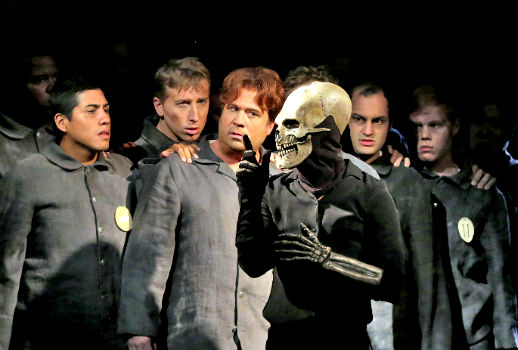
PB: I’m still listening to Magda Olivero and Licia Albanese, who both died recently at 104 and 105 respectively. That’s modern music to me!
DD: I was an opera queen way before I was an opera singer.
PB: Who did you listen to growing up?
DD: Caballé and Corelli were my two singers.
PB: What did you learn from listening to their records?
DD: From Caballé, the legato line. I didn’t really learn much from Franco Corelli except “Wow, what a great voice”
PB: …and legs! How did you get into opera growing up?
DD: My parents. They were both opera singers. My mother was a soprano and my dad was a baritone, and they were both teachers. I grew up in the summers at the Brevard Music Center in the North Carolina mountains, so as a kid I heard Robert Merrill, Renata Scotto, Cornell MacNeil. As a kid you just don’t know what you’re hearing sometimes, but summer after summer, such great voices. They’d do concerts. You just soak it all in. You can’t help it, like a sponge. You’re not even aware of it. You’re not even aware of how lucky you are.
PB: What was your “diva moment”? Your “OMG I can’t believe I’m actually meeting so-and-so?”
DD: The one where I couldn’t speak was James McCracken actually. I was always a big fan of his—and he was so generous to me. That was amazing. And certainly when Martin Katz, my accompanist, friend and colleague played my audition for Columbia Artists Management back in 1992 or ‘93. Martin invited Marilyn Horne to my audition. So, as I’m in the middle of “Di tanti palpiti” [from Rossini’s Tancredi] the back door opens and in she walks. That was pretty amazing. But after I finished singing the Rossini—I’ll never forget this—she came up to the stage and introduced herself, “Hi, I’m Marilyn Horne!” I’m like “I know who you are…”
PB: OMG!
DD: So Martin has a list of my arias, and he asked her, “What would you like to hear him sing?” And she said “Well, something he has a chance to be hired for.” I’ll never forget it. That was awesome. And you know, she was right, I never sang Tancredi.
Photos: Simon Pauly (portrait); Ken Howard | The Santa Fe Opera (Oscar)

















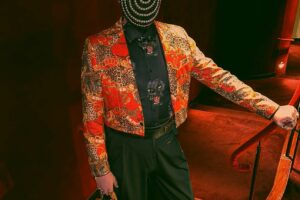
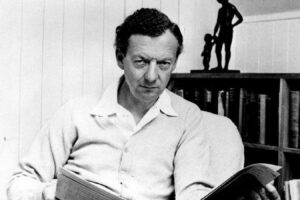







Comments